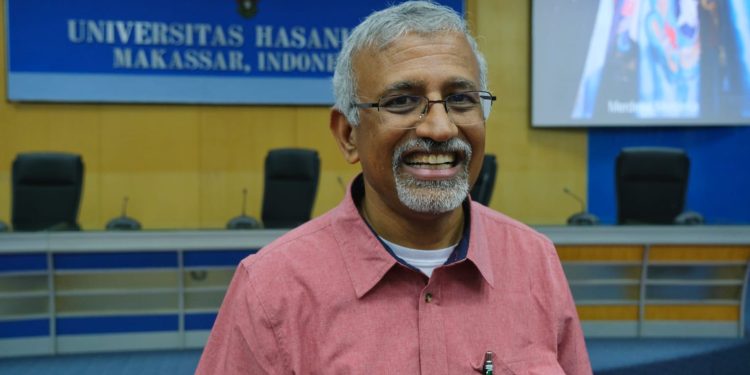The issue of global warming has been getting more and more talked about lately. It is believed that the effects will threaten various areas of the world, especially in the fulfilment of basic needs such as clean water.
According to the United Nations (PBB) which manages water and sanitation at a global level, the water crisis is already happening on many continents. This is due to the ongoing climate crisis and the growing world population that is not proportional to the quantity.
How do experts perceive the phenomenon of the water crisis that has hit several countries and what can be done to overcome this problem? Hasanuddin University Press (PK identitas Unhas) reporter, Zidan Patrio had an opportunity to interview a Hydrology Expert from the University of Colorado, Prof Balaji Rajagopalan PhD, after a public lecture session at the Hasanuddin University Rectorate Building, on Friday (16/06).
In your opinion, do you think the world will eventually be in a state where water is scarce?
Water is a basic necessity. Not just for drinking and washing, people also use it in an attempt to improve their standard of living. An increasing population will also raise the demand for water, and that will threaten the supply.
Many believe that the future world will be at war for water and it is true. Countries like Iran, Afghanistan, Ethiopia, Sudan, Egypt, Pakistan, and India are fighting over and experiencing water shortages today. But several of these countries have found ways to manage their water problems. For example, India and Pakistan have an agreement and keep it despite being at war with each other.
Another case in point are Israel and Palestine, they are at war but it didn’t involve water. They kept an agreement because they knew that water is fundamental.
Besides the issue of global warming with another suspected trigger of the water crisis, are there any other causes?
Climate change is a phenomenon caused by an increase in greenhouse effect gases. But the variability of climate change will have more of an impact in terms of water supply. As I mentioned, it will affect flooding. So, water management will also be much more difficult.
What do you think about Indonesia, is it classified as a country that is facing a water crisis?
Indonesia’s problem is not facing a water crisis but with its water management. It has plenty of water, there is no water crisis here. Indonesia is surrounded by tropical rainforests and this is very different from deserts. Indonesia has good rainfall, and then the water flows into the rivers. But the water quality is very low because of wastage. Jakarta is an example, you can’t even touch it because it is so poisonous. So what Indonesia needs to figure out is how to solve this water management crisis.
How should the government handle the water crisis?
Every region needs a different policy. What the central government can do is by establishing specialised institutions for water management. The solution for Makassar will be very dissimilar from Java.
It is important to look at the water supply, the problems, the climate, the rainfall, the flooding and what needs to be done there. Afterwards, let the regional governments find their own solutions and learn from each other. People sometimes expect the central government to step in.
Meanwhile, at the individual level, awareness of the water crisis must be raised. People need to change their mindset about where water comes from, so understanding it becomes very helpful. Citizens can also change their attitude and be aware of their excessive demand for water.
How do universities play a role in helping to deal with the water crisis?
Universities need to be at the forefront. You don’t have to lead, but be at the forefront of research, innovation, and all the things that need to be done. Universities must generate knowledge, and the knowledge that is generated must be locally based, because the local university in that region understands the problem the most.
If you ask the US federal government, they provide a generous amount of funding to universities in which universities participate in local issues. In the US, if there is a water problem the first thing, they do is ask the experts at the universities in that region. If there are no experts there, they will look outside. So, the University is the frontline for problems that exist in society.
What are your expectations for Indonesia in the future, especially Makassar in terms of water management?
Compared to Jakarta, Makassar is far better. You have good water supply and good water management. I found that 60% to 70% of the water in Makassar is produced from surface water. Whereas in Jakarta it’s the opposite, you have a better advantage.
The problem is if you cannot utilise it properly, you’ll shift quickly. In the next five to ten years, 90% to 100% of water utilisation should come from surface water.
It is not only surface water, deep water use and purchase for consumption is significantly on groundwater. But we cannot rely on that, maybe for emergency purposes but not as a primary source. So I think you guys really need to be ahead of the times. You have a lot of resources and can do good things for water management.
Read the original version in Bahasa Indonesia.
Speaker’s Data:
Name: Prof Balaji Rajagopalan PhD
Educations:
(B.Tech) S1 Civil Engineering, National Institute of Technology, Kurukshetra, India, 1989
(M.Tech.) S2 Operations Research and Reliability, Indian Statistical Institute, Calcutta, India, 1991
(Ph.D.) S3 Stochastic Hydrology and Water Resources, Utah State University, Logan, UT, 1995
Translated by: Nabila Rifqah Awaluddin & Muhammad Alif M.



Discussion about this post